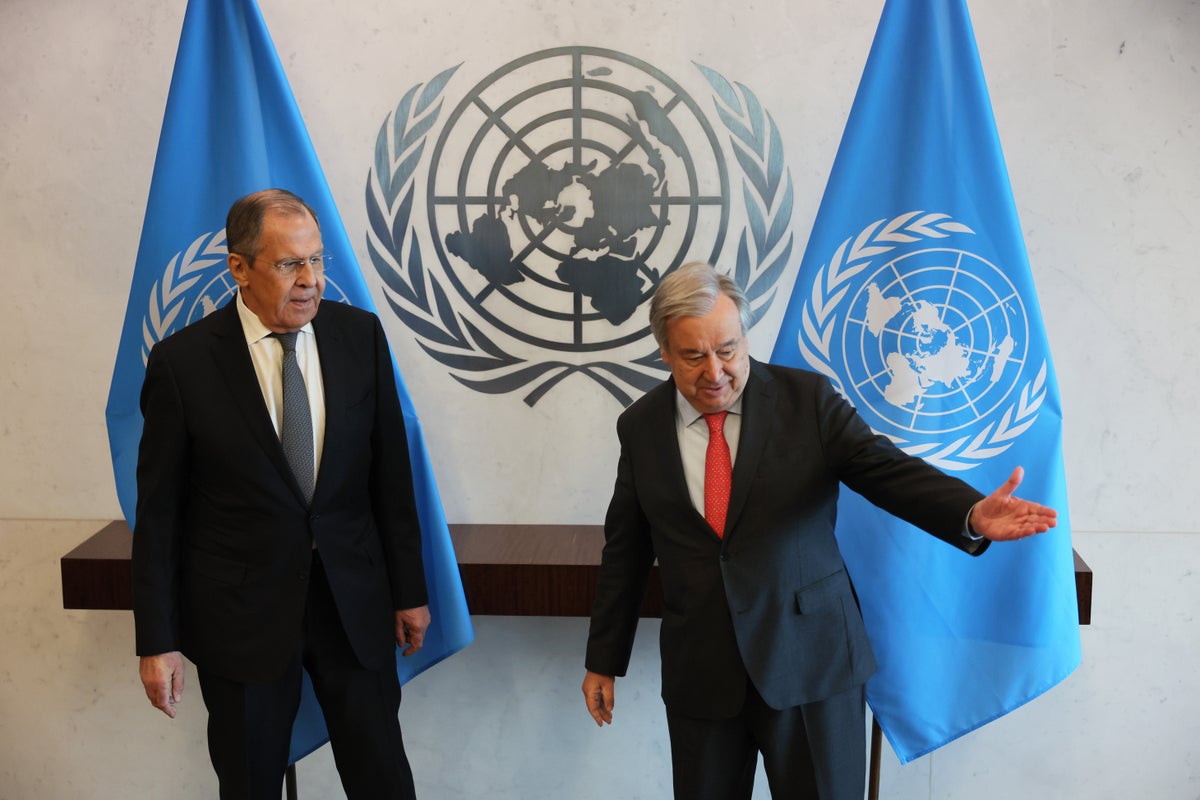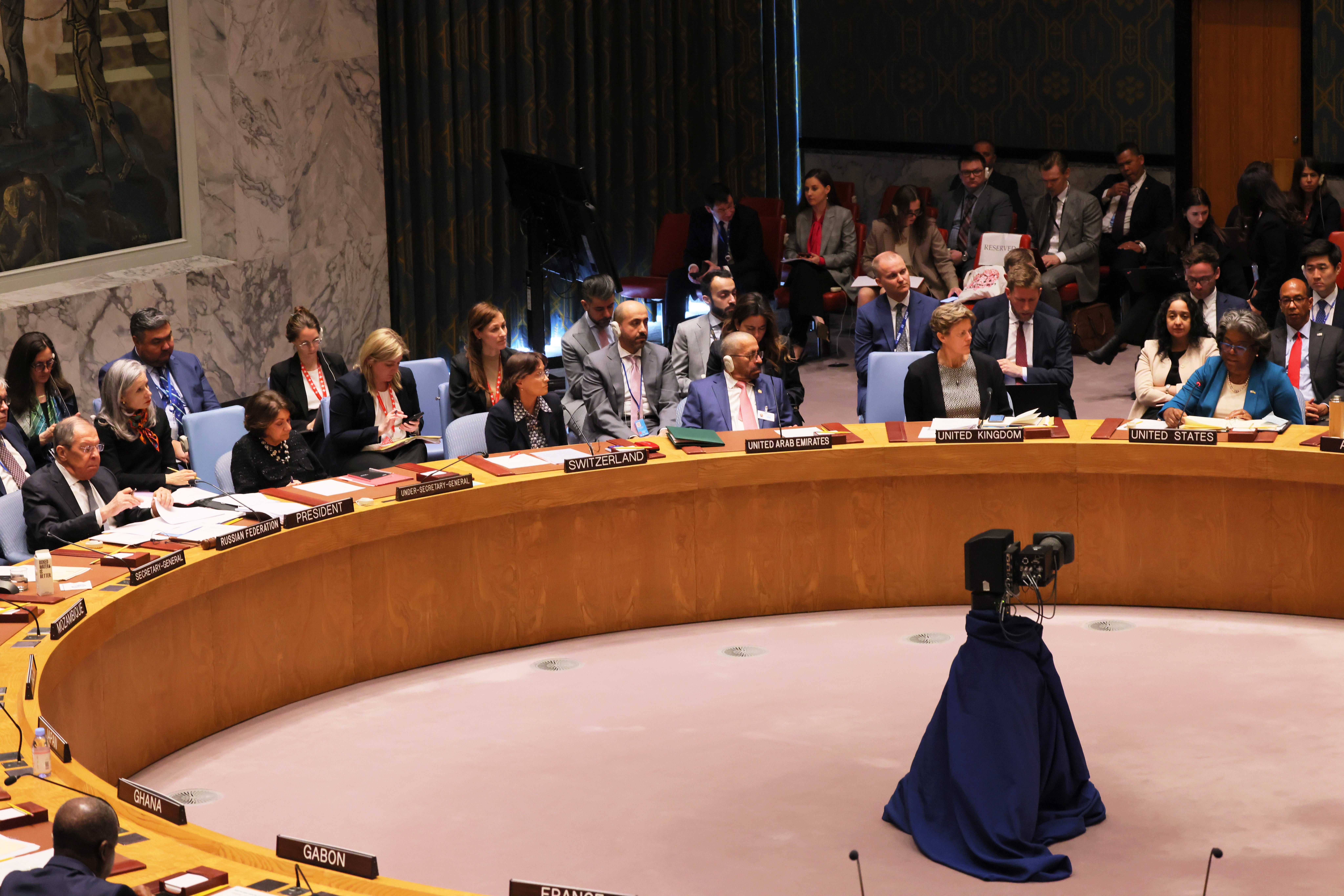
The risk of conflict between global powers is at an “historic high” thanks to the invasion of Ukraine, the head of the UN has said, while Russia’s foreign minister Sergei Lavrov has warned the world is at a threshold “possibly even more dangerous” than during the Cold War.
United Nations secretary general Antonio Guterres spoke seated next to Mr Lavrov in the UN Security Council. Mr Lavrov chaired the meeting because Russia holds the council’s monthly rotating presidency for April.
“As during the Cold War, we have reached the dangerous, possibly even more dangerous, threshold,” Mr Lavrov said. “The situation is worsened with the loss of trust in multilateralism.”
Mr Guterres criticised Russia’s invasion for causing massive suffering and devastation in the country and fueling global economic dislocation caused by the coronavirus pandemic. “Tensions between major powers are at an historic high. So are the risks of conflict, through misadventure or miscalculation,” Mr Guterres told the meeting of the 15-member body on multilateralism and the founding UN Charter.
Mr Lavrov said: “Let’s call a spade a spade. Nobody allowed the Western minority to speak on behalf of all of humankind.”
A string of Security Council members, including the United States, France and Britain, condemned Russia for its war on Ukraine.

“Our hypocritical convenor today, Russia, invaded its neighbour Ukraine and struck at the heart of the UN Charter,” the US ambassador to the United Nations, Linda Thomas-Greenfield, told the council. “This illegal, unprovoked, and unnecessary war runs directly counter to our most sacred principle: that a war of aggression and territorial conquest is never, ever acceptable,” she said.
Elsewhere, China distanced itself from comments by its envoy to Paris that triggered an uproar among European capitals. Several European Union foreign ministers had said comments by ambassador Lu Shaye – in which he questioned the sovereignty of Ukraine and other former Soviet states – were unacceptable and had asked Beijing to clarify its stance.
Asked if Mr Lu’s comments represented China’s official position, foreign ministry spokesperson Mao Ning said that Beijing respected the status of the former Soviet member states as sovereign nations following the collapse of the Soviet Union.
Ms Mao told a regular news briefing that it was her remarks on sovereignty that represented China’s official government stance.
The Chinese embassy in Paris issued a statement later on Monday to say that Mr Lu’s comments on Ukraine “were not a political declaration but an expression of his personal views”.
Both statements, following the backlash, appeared to be an effort to ease the tension with the EU while Washington also cited growing closeness between Beijing and Moscow.
“Beijing has distanced itself from the unacceptable remarks by its ambassador,” top EU diplomat Josep Borrell told a news conference, saying it was “good news”.
The French foreign ministry said it was “taking note” of Beijing’s “clarifications” and that the minister’s chief of staff had met with Mr Lu on Monday, told him his comments were unacceptable and urged him to speak in a way “that is in line with his country’s official stance”.
Mr Lu has earned himself a reputation as one of China’s “wolf warrior” diplomats, so-called for their hawkish and abrasive style.
Asked about his position on whether Crimea was part of Ukraine or not, Mr Lu had said in an interview aired on French TV on Friday that historically it was part of Russia and had been offered to Ukraine by former Soviet leader Nikita Khrushchev.
“These ex-USSR countries don't have actual status in international law because there is no international agreement to materialise their sovereign status,” Mr Lu added.
On the ground, Ukrainian officials have accused Russia of forcibly relocating people from occupied areas near the southern Ukrainian city of Kherson amid reports that Kyiv's forces had established positions on the east bank of the Dnipro, near the city.
“I have information that the evacuation starts... with an excuse of protecting civilians from the consequences of heavy fighting in the area,” Oleksandr Samoylenko, the Ukrainian head of Kherson’s regional council, said. The claim could not be verified, but comes in the middle of an an apparent increase in Ukrainian activity in the south of the country, which some analysts have suggested could be the preamble to a long-awaited counteroffensive from Ukrainian forces in the south and the east of the country.
In Russia, the son of the Kremlin spokesperson Dmitry Peskov has claimed to have served as an artilleryman with the Wagner Group mercenaries in Ukraine for nearly six months. Nikolai Peskov, 33, told the pro-Kremlin daily Komsomolskaya Pravda: “It was my duty … I couldn’t sit to one side watching as friends and others went off there.” His father told reporters on Monday that his son “took part in the special military operation,” but did not give details.
Some in Russia sought to cast doubt on the claims. The VChK-OGPU Telegram channel quoted eyewitnesses as saying Nikolai Peskov's favourite Tesla car – which, it was said, he usually drives himself – was seen “actively” moving around Moscow, and even collecting fines, during the period which he claimed to have served in Wagner.
Reuters contrinuted to this report







